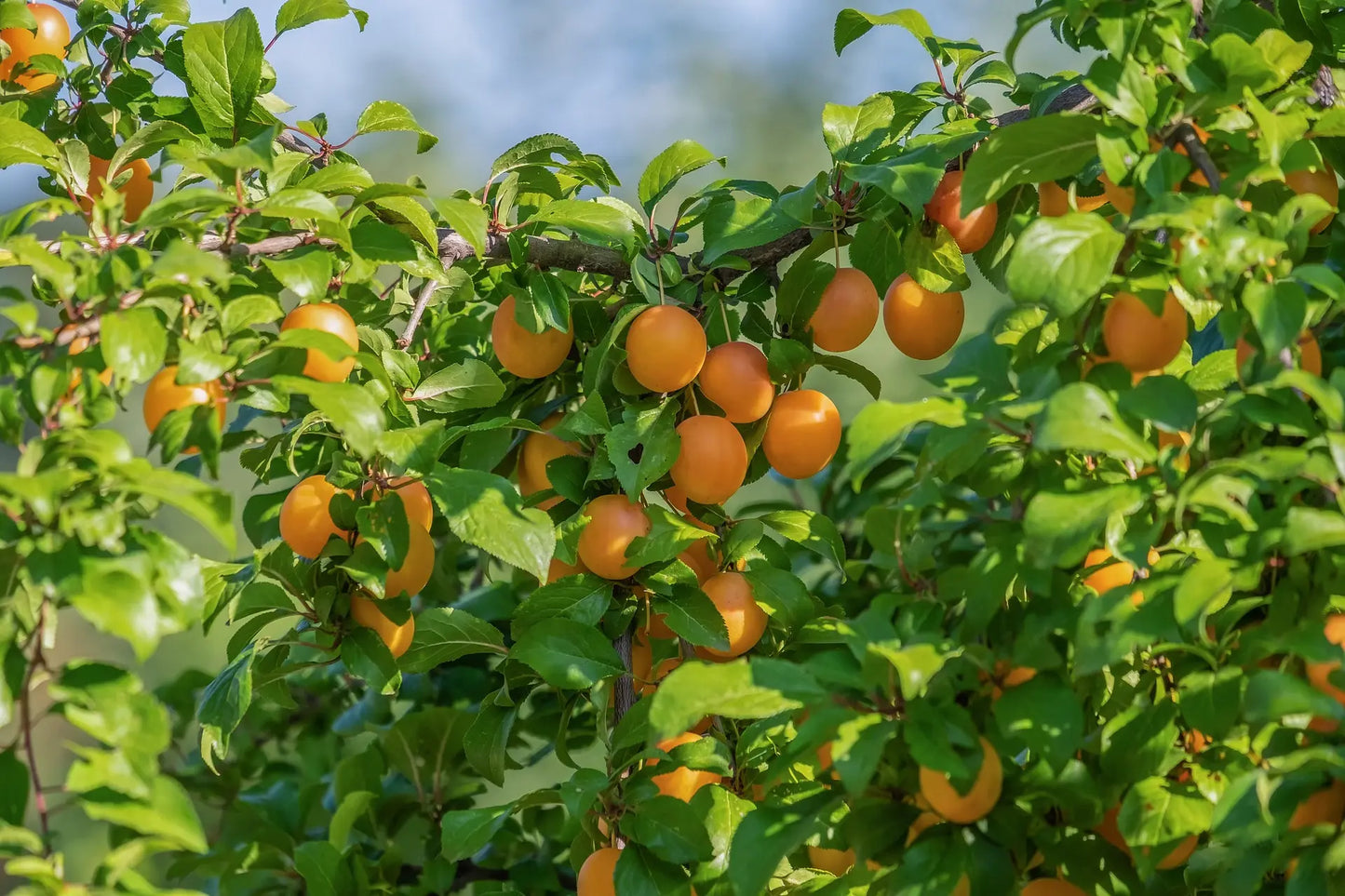-
Delivery from 10 plants to France, Switzerland and Europe
Delivery method -
Fruit Tree Wholesale Supplier
About Us -
Quality Fruit Tree Plants
Technical itinerary
Prune des Béjonnières Plum Half-Standard Tree 8-10 cm diameter bare-root
Prune des Béjonnières Plum Half-Standard Tree 8-10 cm diameter bare-root
The prices shown are our base prices for large volumes. Depending on the quantity ordered and the producers’ pricing scales, the rate may be adjusted upward. Each quote is personalized to ensure you receive a fair price.
Mini order 10 units / Multiple orders 10 units (FRS202412002)
Couldn't load pickup availability
 Buy now and get it delivered when you're ready to plant - Add your desired date to your quote request
Buy now and get it delivered when you're ready to plant - Add your desired date to your quote request
- Delivery from 10 plants to France, Switzerland and Europe

Technical sheet of the Plum tree variety Prune des Béjonnières
- Fruit flesh color: Yellowish, transparent and firm
- Skin color: Golden yellow with red spots and dots
- Size and shape: Medium size, rounded fruits
- Fruit maturity: Early August
- Fruit taste: Juicy, melting, pleasantly sweet, with an apricot aftertaste
- Disease resistance: Good resistance to diseases, particularly codling moth
- Variety yield: A plum tree produces on average between 25 and 50 kilos of fruit per year
- Is this variety self-fertile? Partially self-fertile, productivity is improved in the presence of other plum trees such as "Reine-Claude Dorée" or "D'Ente"
- Commercial use: Fresh, cooked, canned
- Comments: Very drought resistant, late flowering, ideal for traditional fruit pâté
Quick read / the essentials on Prunier Prune des Béjonnières
The Prune des Béjonnières plum tree is an old and rustic variety , originating from Anjou, renowned for its resistance to diseases, its high productivity and its adaptation to hot and dry climates . Selected in 1827 by André Leroy , this variety is particularly appreciated by professional producers thanks to its sweet, juicy and versatile fruits in cooking .
This vigorous and balanced tree, which can reach 4 to 6 meters , has a late flowering , thus reducing the risks associated with spring frosts . It thrives in well-drained soils , even slightly calcareous, and tolerates moderate droughts , which makes it an excellent choice for orchards with low irrigation input .
Its medium-sized plums , with golden yellow skin speckled with red , have translucent, firm and melting flesh , with a sweet taste and a slight hint of apricot . The harvest, staggered from the end of July to the beginning of August , allows for optimal marketing and processing .
Thanks to its high sugar content , the Prune des Béjonnières is ideal for fresh consumption, jams, pastries, distillation and drying into prunes. Its good storage and its ability to be frozen or processed make it a particularly profitable variety .
Arboriverse, your specialist plum tree wholesale supplier , offers you carefully selected Prune des Béjonnières plum trees , grafted onto resistant rootstocks to ensure vigorous growth and optimal production . Buying Prune des Béjonnières plum trees from Arboriverse means ensuring technical expertise , personalized support and a reliable supply for a successful and sustainable orchard .
Its good resistance to diseases such as brown rot and codling moth reduces the need for phytosanitary treatments, making it a strategic choice for sustainable cultivation . As a specialist wholesale supplier of plum plants , we support you in optimizing your yields and ensuring the profitability of your production . Buying Prune des Béjonnières plum plants from Arboriverse means investing in a heritage variety that is profitable and sought after on the market .
Presentation of the Plum Tree Prune des Béjonnières
The Prune des Béjonnières plum tree is an old variety originating from Anjou , selected in 1827 by Mr. André Leroy , a famous nurseryman from Anjou. Known for its hardiness , its resistance to disease and its good adaptation to hot climates , it is appreciated by producers for its exceptional taste quality and its culinary versatility .
Tree characteristics
The Prune des Béjonnières plum tree is a vigorous tree, with a balanced shape, reaching a height of 4 to 6 meters . It develops dense branching which allows good fruit production , while being resistant to winds and climatic variations. Its late flowering , in spring, partially protects it from spring frosts , an important asset for producers in regions with contrasting climates.
Soil and climate conditions and adaptation
The Prune des Béjonnières plum tree is a very hardy variety, well adapted to regions with hot and dry climates , particularly in the south of France. It tolerates calcareous soils relatively well , provided they are well drained and rich in organic matter .
It does not show any particular sensitivity to root asphyxiation , which makes it easy to grow in compact or slightly heavy soils, provided that stagnant moisture is avoided. Its natural resistance to drought makes it an ideal choice for orchards with low irrigation input.
Pollination and yield
This variety is partially self-fertile , meaning that it can fruit on its own, but its production is optimized by the presence of other compatible plum trees. Recommended pollinators include the Reine-Claude Dorée and the Prune d'Ente , which improve the quantity and quality of fruit produced.
The Prune des Béjonnières plum tree is a productive tree, with a staggered harvest throughout the month of August . It offers an average annual yield of 25 to 50 kg of fruit per tree , depending on growing conditions and pollination.
Fruit characteristics
Plums from the Prune des Béjonnières tree are medium-sized , with golden yellow skin, dotted with red spots and blotches when ripe. The flesh is transparent yellowish, firm, juicy and melting , offering a sweet and delicate flavor , with a slight apricot aftertaste that distinguishes it from other varieties.
The fruits fall easily from the tree when ripe and should be harvested gradually to ensure optimum quality.
Harvest period and storage
The Béjonnières plums ripen between the end of July and the beginning of August , depending on the weather conditions. The harvest is spread over several weeks , allowing for gradual picking and better preservation of the fruit.
Plums can be stored at room temperature for a few days or in the refrigerator for one to two weeks . They are well suited to freezing after pitting , and their high sugar content makes them ideal for long-lasting processing , such as jams, compotes, and syrup preserves .
Culinary uses and processing
Thanks to its melting texture and sweet taste , the Béjonnières plum is ideal for fresh consumption , but it is also widely used for making clafoutis, tarts, crumbles and cakes . It is also prized for savory dishes, as an accompaniment to roast meats or in sauces.
Plums can be dried to produce richly flavored prunes , or distilled to make artisanal liqueurs and brandies . They are also used in the production of fruit jellies , a specialty appreciated for their soft texture and intense flavor.
Maintenance and cultivation management
The Prune des Béjonnières plum tree is a low- maintenance variety. Light pruning is recommended every 5 years , mainly to remove dead wood and aerate the tree. Formative pruning during the first few years can be carried out to structure the tree and facilitate harvesting.
Applying organic fertilizer in spring can stimulate growth and improve fruiting, without excess nitrogen, which would promote foliage development to the detriment of fruit.
Moderate watering is sufficient, except in cases of prolonged drought, where additional water may be beneficial.
Resistance to diseases and parasites
The Prune des Béjonnières plum tree has good resistance to common plum diseases , particularly monilia and codling moth (plum worm) , thus reducing losses due to pest infestations.
However, it may be slightly susceptible to rust , a fungal disease that causes spots on the foliage and which can be prevented by treatments with Bordeaux mixture or by applying horsetail decoction .
Regarding pests, there is no specific information indicating a particular vulnerability, but like all plum trees, it can be attacked by aphids and the ermine moth (defoliating caterpillar) . The presence of beneficial insects such as ladybugs and insectivorous birds helps to limit infestations.
Advantages and challenges for production
The Prune des Béjonnières plum tree offers several major advantages for professional growers. Its hardiness , disease resistance , ability to adapt to warm climates and good productivity make it a wise choice for French orchards.
However, some challenges must be taken into account . Although it is partially self-fertile , the presence of another pollinating plum tree is strongly recommended to optimize production. In addition, its sensitivity to rust requires monitoring and preventive treatments, especially in humid conditions.
Finally, staggered harvesting requires rigorous management to ensure good fruit conservation and limit post-harvest losses.
Conclusion
The Prune des Béjonnières plum tree is an old and rustic variety , offering a regular and abundant harvest . Adapted to dry conditions and calcareous soils , it is a reliable option for producers wishing to cultivate a sweet, melting and versatile plum.
Whether for fresh consumption, baking, distillation or processing into prunes , this variety stands out for its taste quality and ease of cultivation , making it a leading choice for professional orchards and short-circuit sales.
To summarize: Plum tree Prune des Béjonnières
The Prune des Béjonnières plum tree is an exceptional variety , prized by professional producers for its robustness, its resistance to disease and the taste quality of its fruits . It adapts perfectly to hot climates and calcareous soils , while requiring limited maintenance .
Its golden fruits, lightly speckled with red , ripen between the end of July and the beginning of August , allowing for a staggered harvest that facilitates marketing and processing . With their sweet and melting flavor , these plums are ideal for fresh consumption, jams, pastries and the production of prunes . They are also very popular in distillation for artisanal brandies and liqueurs .
Despite its partial self-fertility , this variety sees its yield improved in the presence of pollinators such as Reine-Claude Dorée or Prune d'Ente . With an average production of 25 to 50 kg of fruit per tree , the Prune des Béjonnières plum tree guarantees a stable and profitable harvest .
Arboriverse, your specialist plum tree plant wholesaler , offers high-quality Prune des Béjonnières plum trees , grafted onto selected rootstocks to ensure rapid fruiting and long life . Buying Prune des Béjonnières plum trees from Arboriverse means choosing excellence , with tailored technical support to optimize your production .
Thanks to its good resistance to diseases , particularly against brown rot and codling moth , this variety requires little phytosanitary treatment , which makes it an ideal choice for reasoned and sustainable crops . As a specialist wholesale supplier of plum plants , we guarantee you a reliable supply and recognized expertise to guarantee the success of your orchard . Buying Prune des Béjonnières plum plants from Arboriverse means investing in a heritage, profitable and highly sought-after variety .
-
Prune des Béjonnières Plum Scion bare-root organic
Regular price €13,35 EURRegular priceUnit price / per -
Prune des Béjonnières Plum Scion bare-root
Regular price €10,40 EURRegular priceUnit price / per -
Prune des Béjonnières Plum Spindle Tree bare-root
Regular price €14,40 EURRegular priceUnit price / per -
Prune des Béjonnières Plum Half-Standard Tree 8-10 cm diameter bare-root
Regular price €23,70 EURRegular priceUnit price / per -
Prune des Béjonnières Plum Half-Standard Tree 6-8 cm diameter bare-root
Regular price €20,10 EURRegular priceUnit price / per -
Prune des Béjonnières Plum Half-Standard Tree 10-12 cm diameter bare-root
Regular price €25,00 EURRegular priceUnit price / per



